

Climate change is real, and it's affecting our relationship with food in more ways than we can imagine. To start with, it is impacting where our food comes from. For example, warming temperatures are allowing tropical foods to thrive in regions further north where they haven’t before – citrus, for example, is being grown in Georgia and avocados in the island of Sicily.
Coffee is one of the crops that is likely to be hit the hardest by changing weather. The acreage suitable for global coffee production is expected to shrink by half as temperatures continue to rise.
“Climate change is affecting the foods we love – sometimes in ominous ways. CO2 levels in our atmosphere are much higher than they naturally would be, and this will inevitably change things, such as the nutritional content of crops and the flavours in our food,” says Michael P. Hoffmann, Professor Emeritus at Cornell University.
Perhaps food can serve as a wake-up call that will spark people into action.
But luckily, it’s not all doom and gloom: in a study conducted in the United States by Hoffmann and his colleagues, when asked “If you had to choose, which one of the following foods or beverages would you most like to see protected from the negative effects of climate change?” coffee ranked first, with 47% selecting it from a list that also included chocolate (39%), beer (9%), and wine (5%).

How will our food habits be affected?
“Research also shows that even groups of people that are typically viewed as being relatively unconcerned or dismissive about climate change react strongly to the possibility of losing one of the things we love the most: our favourite foods. Perhaps food can serve as a wake-up call that will spark people into action,” Hoffmann adds.
Indeed, it can also lead to unexpected collaborations and great results. For instance, Wärtsilä and family-owned international food and beverage company Paulig combined forces to give guests a taster of what our future might look like at the Dubai 2020 Expo. The two companies demonstrated how coffee can be brewed from the air we breathe, using the latest Power-to-X technology.
During the demonstration, CO₂ produced by visitors’ breaths was collected from the pavilion and converted into synthetic methane, which was used to power the coffee machine.
Unlikely partnerships can really increase cross-pollination; leading to learning experiences that could otherwise be easily missed.
“We wanted to show visitors this technology in a concrete way so that they could experience it themselves. Brewing coffee out of thin air using recycled CO₂ was a great way to explain what Power-to-X is all about,” explains Tommi Rintamäki, Senior Manager, Power-to-X, Wärtsilä Energy Business.
The idea for a collaboration between the two companies was born out of shared values, and a belief in searching for sustainable solutions for the future and tackling climate change.
“We believe we can achieve better results by working together in rather out-of-the-box partnerships, so joining forces at the Dubai Expo was an excellent way for us to collaborate," says Rolf Ladau, President and CEO, Paulig. "Unlikely partnerships can really increase cross-pollination; leading to learning experiences that could otherwise be easily missed."

A wake-up call
Wärtsilä’s commitment to become carbon neutral by 2030 is well underway, and Power-to-X technology provides countless opportunities for new and exciting CO₂ neutral innovations. At the moment, the Power-to-X team has an ongoing project at Wärtsilä Sustainable Technology Hub in Vaasa, where a similar machine used at the Dubai Expo is being used to provide CO₂-lean refreshing air in conference rooms by capturing and storing CO₂ directly from the office building’s ventilation units that feed the air to the conference rooms.
“The air quality in those rooms is similar to what our atmosphere would have been like in pre-historic times. Its effect on mental agility is noticeable because CO2 is what makes us sleepy in a stuffy room, for example. We are increasing people’s alertness and productivity while saving the planet,” Rintamäki comments.
We will have to make big changes, which isn’t always easy, but I have all the faith that we can do it.
In the future, we will need more such solutions. After all, everything in our lives and our menus is changing. Hoffman encourages people to start to pay attention to the foods on their plate and to reflect on how it ended up there, who grew it and where.
“We will have to make big changes, which isn’t always easy, but I have all the faith that we can do it. The more we become informed, the easier it will be to make informed decisions,” he states.
Rintamäki agrees with this sentiment. “It will take time, but I have all the faith that we can fix this and work together to stop climate change. The technological solutions already exist – as we have proven at the Dubai Expo – and new ones are being constantly developed,” he concludes.


